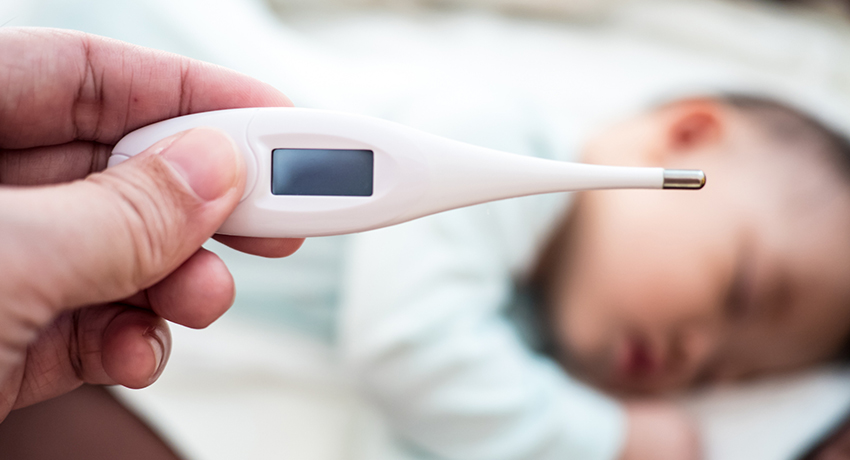Simply put, a febrile seizure is a seizure that can happen in children with a fever.
“It’s estimated about one in 20 children will have at least one febrile seizure in their lifetime,” said Shelley S. Varnado, MD, a pediatric neurologist with UT Physicians.
Young children are most vulnerable

Febrile seizures commonly occur in children from 6 months old to 6 years old. Most happen between 6 months and 3 years old.
“The vast majority of kids outgrow these seizures by about age 6,” said Varnado, an assistant professor in the Division of Child and Adolescent Neurology with McGovern Medical School at UTHealth Houston.
Signs and symptoms
A febrile seizure can present with the same signs as a general seizure.
“You may see jerking or shaking of a child’s whole body, their eyes may roll up, and they may have drooling or foaming from their mouth. You may notice afterward that they have bitten their tongue or urinated on themselves,” said Varnado.
The defining symptom of a febrile seizure is a fever, a temperature greater than or equal to 100.4 degrees Fahrenheit. Other symptoms include the presence of an illness like a respiratory or gastrointestinal virus or a bacterial infection such as strep throat or an ear infection.
While most febrile seizures last less than 5 minutes, some can last up to or longer than 15 minutes.
Cause of febrile seizures
It is important to note that the seizure is not caused directly by the fever.
“While the cause is not 100% known, the seizure is most likely being triggered by whatever illness is behind the fever,” said Varnado.
And because the seizure isn’t caused by the fever, she says you can’t prevent a febrile seizure by treating the fever.
Repeat seizures
If a child has experienced a febrile seizure, there is a 25% – 30% chance they will have a second febrile seizure. It will usually happen within one to two years of the first seizure.
“Once a child has had a febrile seizure, that signals to us their brain is more prone to having seizures as part of an inflammatory response,” explained Varnado.
Most children who experience a febrile seizure will only have a few in their lifetime.
“It’s not a situation where they will necessarily have one every time they have a fever,” she said.
Many repeat seizures, however, could be cause for concern.
“There’s not a strict number of febrile seizures after which we get worried, but if I see a young child in clinic who has a history of five or more febrile seizures, I would start looking for other causes,” said Varnado.
Treatment
While there is no specific treatment to prevent a febrile seizure, she does recommend using children’s acetaminophen or ibuprofen to ease symptoms from the fever if your child is feeling unwell.
For children who suffer from repeat febrile seizures, Varnado says a rescue medication may be a good option.
“It’s a medication to give their child at home if the seizure lasts longer than 5 minutes. After 5 minutes, the seizure is less likely to stop on its own and there is a higher chance of needing medication to stop it,” she said.
How to respond to a febrile seizure
Varnado says that when a child has a first-time seizure, it is understandable for parents, guardians, and caregivers to be frightened and panic, but it’s important to stay calm and follow seizure first aid.
First, make sure the child is safe and lying on their side. Then, call 911, and begin timing the duration of the seizure. If you can, have someone record a video of the seizure for a doctor to review afterward.
If your child is already diagnosed with having a predisposition to febrile seizures, meaning they have already experienced one, dialing 911 may not be necessary.
“I certainly recommend calling 911 anytime you feel uncomfortable or concerned, but if the seizure is short, it stopped, and your child is starting to recover, it’s okay to keep them home and contact your pediatrician,” Varnado said.
You should call 911 if the seizure lasts longer than 15 minutes and if you use rescue medication for the first time, she adds.
No developmental impact
A seizure itself is the brain being in a state of hyperactivity.
“It’s basically when all the cells in your brain are simultaneously firing,” explained Varnado.
The good news is that having one febrile seizure, or even a couple throughout life, is not harmful to the brain.
“There are a lot of misconceptions that a high fever or a fever from a seizure is going to ‘fry your brain,’ which is not true,” said Varnado. “Children who experience a few febrile seizures in their life do not have an increased risk of epilepsy. The vast majority of kids will outgrow this without any long-term consequences.”



